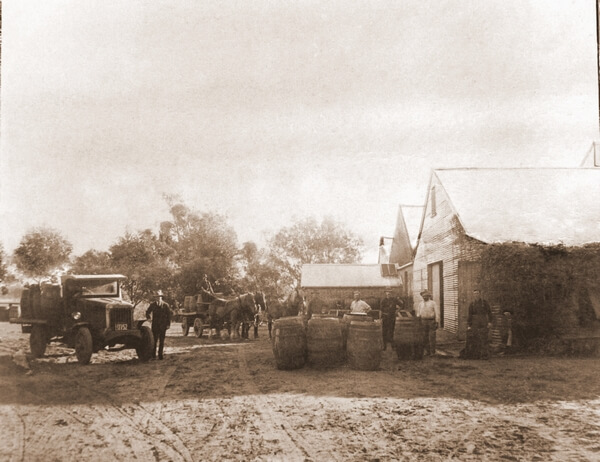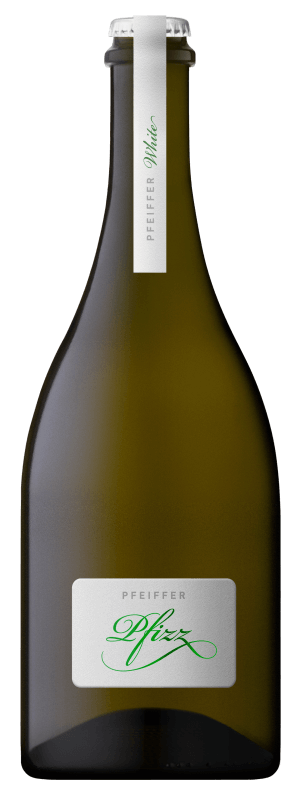The Wombelano Vineyard in Wahgunyah, (known as the Alida Vineyard at the time) was purchased by David Masterton and Charles Leonard Dobbin in November 1898. They purchased it from noted Frenchman, Joseph Gassies, who may have just anticipated the arrival of Phylloxera the following year. David Masterton was 22 and Charles Dobbin was just 20.
Little is known of David Masterton’s early life, except that he was born in Lochee, Dundee, Scotland in 1876, the son of James Masterton and Elizabeth Anderson. He emigrated to Australia in 1896 when he was 20.
Charles Leonard Dobbin was the son of a noted Melbourne magistrate. He was born in South Melbourne on the 28th September 1878. He attended Carlton College, a private school in Royal Parade and was a natural athlete and popular at school. He played 1st grade cricket in summer and captained the 1st grade football side in winter. His sublime skills and pace saw him debut for the Carlton Football Club against Richmond in 1895, aged 17.
Charles lost his mother in the early months of 1898. He was just 20. His parents had relocated to Wangaratta a few years prior, when CL Dobbin Senior had been appointed the Police Magistrate of the district. Much loved, his mother’s kind and charitable nature endeared her to all and her death was a devastating blow to the family.
We will never know what impact his mother’s death had on Charles, or how both boys met, but in December of that same year, in 1898, aged just 20, Charles Leonard Dobbin and his newly formed business partner David Masterton (aged 22 and who had only been in Australia for two years) purchased the 320 acre Alida vineyard for £2,400.
It included an area under vine, located in a corner made by an anabranch of the Murray River known as Sunday Creek, (what is now the Pfeiffer Wines Sunday Creek vineyard), a prized flat, thought to be an old bed of the Murray River. The deep alluvial soil, top dressed with a rich layer of river silt after every flood, was also known to produce the most consistently heavy crops of grapes grown in the district.
The partnership got off to a bumpy start when Phylloxera, a microscopic aphid that lives on and eats the roots of grapes did arrive in Rutherglen in 1899. Fortunately it never got into the Alida vineyard and for the early years the two men focused on the table grape trade, marketing and selling their prized Doradilla grapes.
In 1899 they sold in excess of 1000 cases of fresh table grapes, however an overproduction in the industry and a failure by the market to significantly open up an export trade, meant there was no financial security, so the pair turned their attention to other opportunities.
As Joseph Gassies had recognised during his tenure, the clear waters of Sunday Creek and the good drainage at the property made the Wahgunyah site ideal for distillation. In 1902 in the same year CL Dobbin Senior passed away suddenly, Charles Dobbin undertook a special study of spirit distillation, with David Masterton taking control over the commercial side of the venture. By August of that year the partners began distilling grape spirit.
In 1905, Masterton and Dobbin significantly expanded their distilling plant. They purchase an 800 gallon pot still from Bergstrom of Adelaide and a high pressure boiler and engine came from the works of Kelly and Lewis in Melbourne. The following year, in 1906 David Masterton married Jeanette Cullen, the 2nd daughter of Mrs William Cullen of Gorthleck, Wahgunyah.
The distillation business flourished and by 1910 the young men were supplying fortifying spirit to most of the winemakers of the district as well as producing premium brandy (using Doradilla and Riesling grapes) for the purpose of export.
Seven iron tanks kept within a bonded store on-site now held 10,000 gallons of pure spirit. Windows were barred and locked, and the keys held by the Government Excise Officer. Two Excise Officers remained in attendance during each vintage, one resided at the distillery all year.
In need of even more wine, in 1910 the partners rented the cellars at Chaffey Vineyard in Mildura to crush and ferment excess Gordo grapes of the region, initially sending the wine 500miles back to Wahgunyah for distillation. Charles Dobbin remained in Mildura to manage the Mildura Wine Company and it was during this time that he met his future wife Ailsa Desailly.
The next five years saw significant growth and substantial commercial investment by the men. After the death of David Masterton’s father James in Glasgow in 1911, David Masterton purchased nearby Quondong in 1912. The same year they appointed Malcolm MacCallum as the Manager of their Distillery in Wahgunyah and in what must have been a significant financial burden, they constructed their Distillery Bridge (now known as the Sunday Creek Bridge). They also purchased the Medoc vineyard, which was owned by F.W Clfford, but originally established by local identity Camille Reau. It was 306 acres and although the auctioneers did not in their report divulged the price, which was for cash, it was rumoured it was a staggering £12 per acre.
The partnership was also noted at this time for its prized dairy and their famed “Wombelano” Jersey herd. There was also pig breeding, irrigated green fodder and with David Masterton’s keen eye for a good horse, a high standard horse breeding program.
In 1914 W. Squires of Corowa was successful in having his tender for construction of new cellarage at property approved and the following year Charles Leonard Dobbin married Ailsa Desailly in South Yarra, Melbourne.
By 1915 the Wahgunyah operation was distilling in excess of 30,000 gallons (136,000 litres) of wine a year (obtaining 5000 gallons of proof spirit) and more than 200,000 gallons of wine (just under 1,000,000 litres) was being distilled in the Merbein and Irymple operations.
It was around this time though, the first hints of the health decline of David Masterton appeared and in June 1915 he travelled to Java for two months to convalesce, under the care of the Dutch Consul General.
In the same month, and with the onset of World War I, Charles Dobbin, now 37, enlisted in the AIF, joining the 7th Battalion. He embarked from Australia in November 1915 and served with the 5/7th (2 Brigade) in Alexandria, France and Belgium. He was involved when the heavy fighting commenced at Pozieres (the Somme) and Ypres and was engaged in heavy fighting at Menin, Broodseinde, and once again at Ypres.
Charles Dobbin was wounded in October 1917 with a severe gunshot wound to his feet which turned septic. He was hospitalised and evacuated to London and was posted into two temporary roles whilst in recovery at the Tidworth Military Hospital; an Instructional and Battalion Commanders role at The School of Wiring Tidworth and also an Instructional role with the 2nd Army School of Musketry. He returned to Australia after serving 4 years overseas on the troopship Suffolk.
12 months after the War had ended, Charles Dobbin, David Masterton and a syndicate made up of local vignerons and businessmen including Oscar Seppelt, W. H. Chambers, George Gehrig, Frank Herman, Jack Glover and Malcolm MacCallum purchased the St Leonards vineyard and winery for £22,000. Charles and Ailsa took up residence at the St Leonards homestead that same year and would remain there for the next 44 years.
In 1920 David Masterton was appointed the President of Federal Viticultural Council of Australia but in further evidence of poor health David Masterton was hospitalised in January 1921 with a haemorrhage of the stomach. Recovery was again necessary and he and his wife Jeanette left Australia in May 1921 and spent the next 9 months in England and Europe. Upon returning home he decided to relinquish his dairying pursuits and sell off their famed “Wombelano” Jersey herd.
Despite his on-going health problems David Masterton was appointed as the fourth member of the Tariff Board of Australia in 1924 and served in this capacity until 1929. His appointment was announced by the Acting Prime Minister Dr Earle Page. For the next three years he also regularly travelled to England to “open a permanent market in Great Britain for the sale of Rutherglen wines”
In the same period Charles Dobbin was also extremely busy. He was a prominent Rutherglen Councillor and also heavily tied up in the St Leonards operations. Malcolm MacCallum had been managing the business for almost three decades and with both men focussed on other things, neither saw what must have been going on for years. Workers and quite possibly the Excise Officer himself were illegally selling their valuable spirit and by 1937, 39 years after David Masterton and Charles Dobbin had started it, the distillery was broke and went into voluntary liquidation.
The vineyard property and business at Wahgunyah was sold to Angus Cullen in what may have been a last effort by David Masterton to keep the venture, however the resale occurred to Seppelts within 8 weeks, on the 6th August 1937. David Masterton, after a long illness, died on the 13th Oct 1937 at his South Yarra home, aged 61. Two of his pall-bearers were signficant public figures and well regarded businessmen (and also Scotsman), Sir Walter Leitch and Brigadier General Evan Wisdom. David Masterton eventually died of Carcinoma of the throat, but had possibly had cancer for years.
Little is known of Charles Leonard Dobbin after this time. Census and Voting records indicate he and Ailsa remained at St Leonards until the 1960’s. His only daughter, Ailsa Muriel Diana Dobbin went on to marry the son of a war hero, Stamer Gubbins in July 1940. They lived in Hawthorn for many years but it is unknown if they had children. With the passing of his brother, William Summers Dobbin in 1952 and his sister, Martha Gwendolyn Dobbin in 1964, the family line appears to have sadly been extinguished.
Charles Leonard Dobbin, footballer, distiller, vigneron, Lieutenant in the AIF and once the most popular boy at Carlton College died on the 27th April 1965. He is buried in a commissioned war grave beside his wife of 50 years. Charles Leonard Dobbin was 87.

David Masterton

Charles Leonard Dobbin

Ailsa Dobbin

Masterton and Dobbin Distillery

Masterton and Dobbin Distillery

Wombelano



